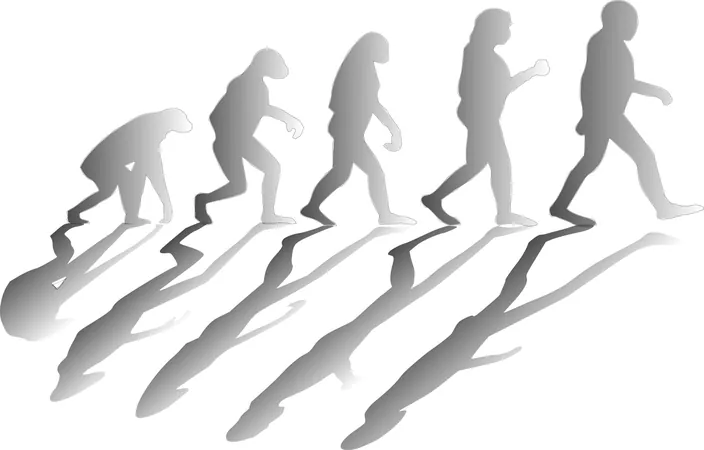
Has Culture Become Humanity’s New Blueprint for Evolution?
2025-09-15
Author: Daniel
A Shocking Shift in Human Evolution
Researchers at the University of Maine are proposing a groundbreaking idea: human evolution may now hinge more on culture than on genetics. In a revolutionary study published in BioScience, Timothy M. Waring, an associate professor, and researcher Zachary T. Wood suggest that cultural practices are now the primary engine driving our evolutionary journey.
Culture: The New Evolutionary Engine
"Human evolution seems to be changing gears," states Waring. As humans acquire new skills, technologies, and institutions through cultural learning, they inherit adaptive solutions that can respond to challenges much faster than genetic evolution can. This indicates that we might be undergoing a colossal evolutionary transition.
Cultural practices—ranging from agriculture to legal systems—spread and evolve at a speed unfathomable to genetic change. This ability empowers human groups to tackle new challenges and adapt to various environments in ways that biology alone cannot match.
Culture Superseding Genetics
Wood dramatically states, "Cultural evolution eats genetic evolution for breakfast," emphasizing the immense power of cultural systems in contemporary society. These systems have adapted so quickly that they actually outpace genetic evolution. For instance, eyeglasses and medical surgeries now resolve vision issues once left to the slow hands of natural selection.
Innovations like cesarean sections and fertility treatments enable individuals to survive and reproduce in situations that would be disastrous under pre-modern conditions. This shift implies a declining role for genetic adaptation, making us increasingly dependent on cultural frameworks such as healthcare, education, and governance.
The Growing Influence of Culture
Waring invites us to consider a vital question: "What matters more for your well-being—the genes you inherited or the society you inhabit?" He argues that our fate is being shaped more by cultural phenomena than by biological inheritance, highlighting a significant transformation in what influences our life outcomes.
Culture: A Collective Experience
Waring and Wood draw parallels from anthropology and history to illustrate how collective cultural evolution has been key in shaping human societies. From ancient agricultural practices to modern states, advancements in areas like healthcare and education are products of group adaptation rather than individual genetic changes.
A Fundamental Philosophical Shift
In evolutionary history, there have been shifts that redefine the concept of individuality, such as the development of multicellular organisms from single cells. While skeptics within biology suggest such a transformation in humans is unlikely, Waring and Wood argue that the move toward cultural adaptation implies a fundamental reorganization of human individuality—favoring groups over individuals.
"Cultural organization compels groups to be more effective and cooperative, enhancing their ability to adapt," says Waring. He notes that as societies grow, so does their capacity for cultural innovation and survival.
Anticipating the Future
The researchers assert that their theories can be tested. They are developing mathematical models to track this transition and planning long-term data collection studies. However, they caution against interpreting cultural evolution as a straightforward path to progress.
Wood adds, "Just because some societies are wealthier does not make them morally superior. Evolution produces both beneficial solutions and harsh realities. Our goal is to steer humanity away from the harsher outcomes."
Rethinking Humanity’s Destiny
While Waring and his team conduct further research at the Applied Cultural Evolution Laboratory, they are igniting considerable discussion about humanity's future. If cultural inheritance becomes the dominant force in our evolution, our individual fates and the long-term survival of our species could increasingly depend on the resilience and adaptability of our societies.
In this new narrative, the next chapters of human evolution may not be inscribed in our DNA, but rather in the rich tapestry of shared experiences, systems, and institutions we collectively construct.



 Brasil (PT)
Brasil (PT)
 Canada (EN)
Canada (EN)
 Chile (ES)
Chile (ES)
 Česko (CS)
Česko (CS)
 대한민국 (KO)
대한민국 (KO)
 España (ES)
España (ES)
 France (FR)
France (FR)
 Hong Kong (EN)
Hong Kong (EN)
 Italia (IT)
Italia (IT)
 日本 (JA)
日本 (JA)
 Magyarország (HU)
Magyarország (HU)
 Norge (NO)
Norge (NO)
 Polska (PL)
Polska (PL)
 Schweiz (DE)
Schweiz (DE)
 Singapore (EN)
Singapore (EN)
 Sverige (SV)
Sverige (SV)
 Suomi (FI)
Suomi (FI)
 Türkiye (TR)
Türkiye (TR)
 الإمارات العربية المتحدة (AR)
الإمارات العربية المتحدة (AR)